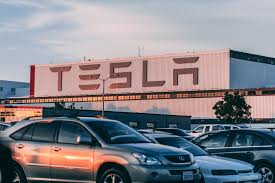
Breaking News
 Tesla Has A New, Cheaper Model Y. Will It Work?
Tesla Has A New, Cheaper Model Y. Will It Work?
 The Japanese Yen Carry Trade Is Breaking: The Trillion-Dollar Risk
The Japanese Yen Carry Trade Is Breaking: The Trillion-Dollar Risk
 Let's Do a Detailed Review of Zorin -- Is This Good for Ex-Windows Users?
Let's Do a Detailed Review of Zorin -- Is This Good for Ex-Windows Users?
 The World's First Sodium-Ion Battery EV Is A Winter Range Monster
The World's First Sodium-Ion Battery EV Is A Winter Range Monster
Top Tech News
 How underwater 3D printing could soon transform maritime construction
How underwater 3D printing could soon transform maritime construction
 Smart soldering iron packs a camera to show you what you're doing
Smart soldering iron packs a camera to show you what you're doing
 Look, no hands: Flying umbrella follows user through the rain
Look, no hands: Flying umbrella follows user through the rain
 Critical Linux Warning: 800,000 Devices Are EXPOSED
Critical Linux Warning: 800,000 Devices Are EXPOSED
 'Brave New World': IVF Company's Eugenics Tool Lets Couples Pick 'Best' Baby, Di
'Brave New World': IVF Company's Eugenics Tool Lets Couples Pick 'Best' Baby, Di
 The smartphone just fired a warning shot at the camera industry.
The smartphone just fired a warning shot at the camera industry.
 A revolutionary breakthrough in dental science is changing how we fight tooth decay
A revolutionary breakthrough in dental science is changing how we fight tooth decay
 Docan Energy "Panda": 32kWh for $2,530!
Docan Energy "Panda": 32kWh for $2,530!
 Rugged phone with multi-day battery life doubles as a 1080p projector
Rugged phone with multi-day battery life doubles as a 1080p projector
 4 Sisters Invent Electric Tractor with Mom and Dad and it's Selling in 5 Countries
4 Sisters Invent Electric Tractor with Mom and Dad and it's Selling in 5 Countries
Future Tesla Battery Technology and Pricing

This will be from improving processes going to the Tesla-Maxwell dry cell technology and with improved energy density and increasing the volume and other manufacturing efficiencies.
The global automotive lithium-ion battery market could reach about $95-100 billion per year by 2030.
A Cleantechnica analysis of the Tesla Cybertruck seems to show an implied 45% improvement in battery prices to about $100-110 per kwh by 2021.
$94 per kwh is the pricing expected in 2024 by Bloomberg New Energy Finance analysis.
InsideEVs performed a cost analysis of the new Tesla Maxwell dry cell technology which estimated a 20% improvement in battery pricing. This analysis did not take into account the lighter cars and price improvements from higher energy density from the new Maxwell batteries. Maxwell batteries should have about 30% higher energy density initially at about 385 watts per kilogram and could get another 30% when they increase to 500 watts per kilogram.



